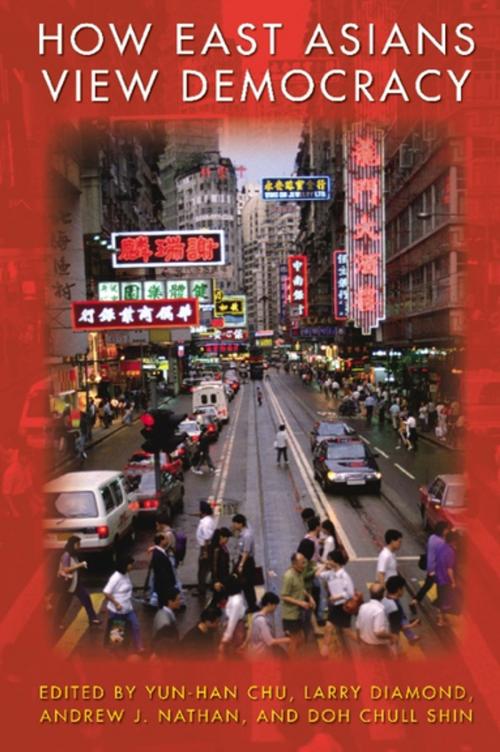How East Asians View Democracy
Nonfiction, History, Asian, Asia, Social & Cultural Studies, Political Science, International, International Relations| Author: | ISBN: | 9780231517836 | |
| Publisher: | Columbia University Press | Publication: | September 1, 2008 |
| Imprint: | Columbia University Press | Language: | English |
| Author: | |
| ISBN: | 9780231517836 |
| Publisher: | Columbia University Press |
| Publication: | September 1, 2008 |
| Imprint: | Columbia University Press |
| Language: | English |
East Asian democracies are in trouble, their legitimacy threatened by poor policy performance and undermined by nostalgia for the progrowth, soft-authoritarian regimes of the past. Yet citizens throughout the region value freedom, reject authoritarian alternatives, and believe in democracy.
This book is the first to report the results of a large-scale survey-research project, the East Asian Barometer, in which eight research teams conducted national-sample surveys in five new democracies (Korea, Taiwan, the Philippines, Thailand, and Mongolia), one established democracy (Japan), and two nondemocracies (China and Hong Kong) in order to assess the prospects for democratic consolidation. The findings present a definitive account of the way in which East Asians understand their governments and their roles as citizens. Contributors use their expert local knowledge to analyze responses from a set of core questions, revealing both common patterns and national characteristics in citizens' views of democracy. They explore sources of divergence and convergence in attitudes within and across nations.
The findings are sobering. Japanese citizens are disillusioned. The region's new democracies have yet to prove themselves, and citizens in authoritarian China assess their regime's democratic performance relatively favorably. The contributors to this volume contradict the claim that democratic governance is incompatible with East Asian cultures but counsel against complacency toward the fate of democracy in the region. While many forces affect democratic consolidation, popular attitudes are a crucial factor. This book shows how and why skepticism and frustration are the ruling sentiments among today's East Asians.
East Asian democracies are in trouble, their legitimacy threatened by poor policy performance and undermined by nostalgia for the progrowth, soft-authoritarian regimes of the past. Yet citizens throughout the region value freedom, reject authoritarian alternatives, and believe in democracy.
This book is the first to report the results of a large-scale survey-research project, the East Asian Barometer, in which eight research teams conducted national-sample surveys in five new democracies (Korea, Taiwan, the Philippines, Thailand, and Mongolia), one established democracy (Japan), and two nondemocracies (China and Hong Kong) in order to assess the prospects for democratic consolidation. The findings present a definitive account of the way in which East Asians understand their governments and their roles as citizens. Contributors use their expert local knowledge to analyze responses from a set of core questions, revealing both common patterns and national characteristics in citizens' views of democracy. They explore sources of divergence and convergence in attitudes within and across nations.
The findings are sobering. Japanese citizens are disillusioned. The region's new democracies have yet to prove themselves, and citizens in authoritarian China assess their regime's democratic performance relatively favorably. The contributors to this volume contradict the claim that democratic governance is incompatible with East Asian cultures but counsel against complacency toward the fate of democracy in the region. While many forces affect democratic consolidation, popular attitudes are a crucial factor. This book shows how and why skepticism and frustration are the ruling sentiments among today's East Asians.















